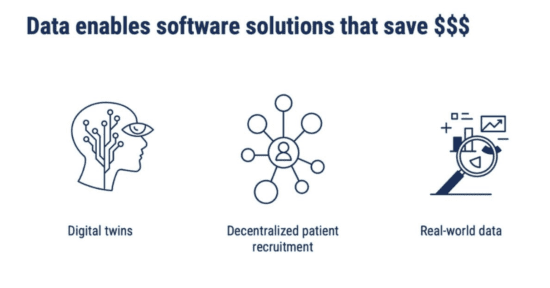Machine learning can also accelerate the regulatory submission process, as the massive amounts of data generated during clinical trials can be captured and effectively shared to collaborate between investigators, contract research organizations (CROs) and sponsor organizations. In pharmacovigilance, huge amounts of structured and unstructured data need to be reviewed so that we can provide oversight. Machine learning and NLP models are allowing us to address many of the challenges that PV teams face when it comes to harnessing data to provide enhanced quality and oversight. These kinds of tools allow us to automate some of the highly manual processing tasks, and they can also translate and digitize documents on safety cases and adverse drug reactions (ADRs) to make them easier to use. They can also perform data listening tasks to monitor conversations on social media and other platforms, ensuring adverse events are promptly identified.
Also, the commercialization of life science solutions is an area that’s ripe for innovation with data, analytics and AI. Novartis made headlines in 2019 when it armed its sales force with an AI-driven service to tell sales reps which doctors they should visit and what topics they should bring up once they got through the door. The COVID-19 pandemic meant that sales reps couldn’t see doctors face-to-face, and so many pharma companies switched their focus to AI in an effort to get their brands noticed by the right doctors at the right time.
Applications for AI in the commercial side of life sciences include weeding out content that regulators would disapprove of and building relationships with patients. Recent innovations like ChatGPT have shown that companies might even use machines to write promotional copy. Experts expect more drug makers to follow in the footsteps of other industries and to use AI to further boost their brands in the coming years as they figure out how to use sensitive patient and provider data in a way that allows for better commercial activities without violating privacy.
More pharma marketers are expected to use chatbots in the near future. Novo Nordisk debuted its digital concierge chatbot Sophia back in 2018, and they’re becoming more mainstream. As well as appearing more human, these bots will work more closely with other services, scheduling telemedicine appointments or helping patients to find pharmacies and specialist physicians. AI will expand the possibilities for truly engaging with patients.
Other key applications of AI in commercial life sciences include content creation, audience targeting and compliance automation. Companies are already using AI tools to generate routine promotional material like personalized subject lines for emails. This allows for a truly one-to-one marketing program that’s scaled to an entire HCP or patient database. The increasing amount of online patient data and the rich databases of providers allow AI solutions to know about patients and their provider histories, as well as what their interests or issues might be. As such, life science companies can take a far more intelligent approach to content strategy and content engagement. For example, a patient in the middle of cancer treatment might welcome information about a drug maker’s patient support program or tips for managing side effects from an IV infusion, even though that kind of messaging might not appeal to the masses in a broad marketing campaign.
Although there are concerns around privacy and doctor-patient relationships, good controls could allow patients to benefit from the AI-based personalized marketing that we see in other industries. Given the increase in customized digital marketing, there’s been a noticeable rise in the amount of promotional content that we see. This shows us another promising use of AI, which is to review content to ensure it’s consistent with drug labelling and regulatory guidance. Using AI, errors can be found in marketing content earlier in the process and as a result, companies can get that content out quicker. Just like other applications of AI in healthcare, it would be augmenting humans and not replacing them. AI can process large amounts of content and allow personalization at scale for life science campaigns by taking a first pass at screening a marketing message and determining if it’s fully compliant.






